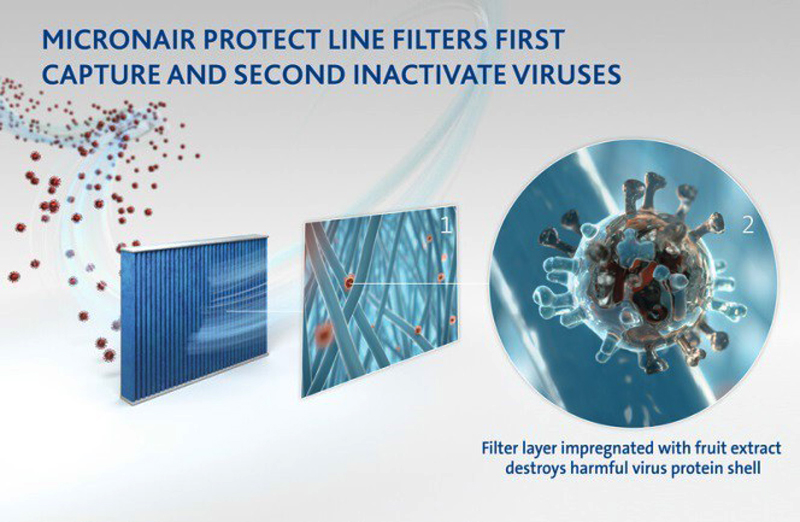Automotive interior filters of the micronAir® proTect line, which Freudenberg manufactures for car manufacturers, can filter roughly more than 90% of the viral aerosols
Vehicle cabin air filters by Freudenberg Filtration Technologies contribute to effective surface protection from a range of viral attacks. Recent ISO 18184 tests conducted by the renowned Guang Zhou Institute of Microbiology (China) have shown the company’s micronAir® proTect line filters to inactivate virtually 100% of the viruses by a unique anti-viral filter layer. Alongside the global manufacture of face masks, the Freudenberg Group is helping to reduce the risk of infection with efficient high-tech filtration solutions.

In the wake of the current corona virus pandemic, health authorities around the globe are focusing on ways to contain the virus and flatten the infection curve. The first step to prevent viral airborne aerosols from causing harm is to directly filter them from the ambient air and secondly to inactivate the critical virus load by an anti-viral filter media layer. In closed environments like vehicle interiors, which pose a higher risk of infection through inhalation, filtrating airborne aerosols from the air is key to keep passengers safe. The solution serves as an effective shield against airborne aerosols transmitting pathogens such as H1N1 and HCoV-229E.
Thanks to a sophisticated dual mode of action, micronAir® presents a viable option compared to other available cabin filter solutions, including the high-efficiency particulate air (HEPA) filters. “To reach this vital goal, our micronAir® cabin air filters follow a two- pronged approach,” Ashok Pandey, Head, Automotive Filters at Freudenberg Filtration Technologies, India points out. “Our cabin air filter solution captures aerosol droplets and droplet nuclei within the range of 0.05-16 μm. As the latest corona virus studies of the World Health Organization (WHO) showed, these aerosols contain the critical virus load, causing harm as they are emitted during breathing, talking, coughing or sneezing.”
“Once captured on the filter, the viruses are inactivated through a patented approach based on natural fruit extracts to prevent secondary contamination,” he added. Upon reaching the filtration medium, viruses interact with the fruit extract’s acid environment. The reaction causes the rendering or denaturation of the virus’ protein structure, which leads to a harmless pathogen unable to infect human cells. In the recirculation mode, removing viruses from the air largely depends on the efficiency of the filtration system and the air exchange rate.
Automotive interior filters of the micronAir® proTect line, which Freudenberg manufactures for car manufacturers, can filter roughly more than 90% of the viral aerosols. The first two layers capture most of the ultrafine aerosols. The optional third layer captures harmful gases. An innovative fourth layer coated with fruit extract then inactivates almost 100% of the detected viral load, preventing the release of active viruses back into the cabin air following vibration. This has been demonstrated in a series of comprehensive tests carried out in cooperation with an independent external research institute.